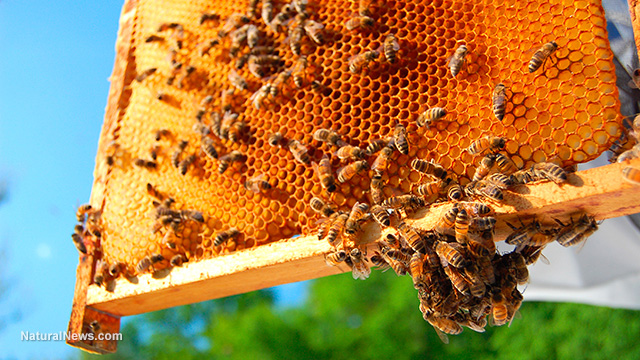World's most heavily used pesticide set to wipe bees off the face of the earth, leading to mass human starvationSunday, August 28, 2016

(NaturalNews) A widely used class of pesticides implemented in the U.S. over the last 20 years continues to threaten the survival of important pollinator insects,
including honeybees. Neonicotinoids, or neonics for short, closely resemble nicotine, and are biologically active at very low concentrations. They're used in monoculture or chemical-based farming to ward off insects.
Neonics work by adversely affecting the central nervous system of insects, binding to receptors "of the enzyme nicotinic acetylcholine," which excite the nerves and eventually cause paralysis and death.
The pesticides are applied as a seed coating or sprayed directly onto the crop. Because they are systemic pesticides, neonics are taken up by the plant and transferred to its leaves, flowers, roots and stems, as well as the pollen and nectar.
Majority of corn and canola seed in the U.S. treated with neonics
Nearly all of the corn seed used in the U.S. is treated with neonics, as is more than 90 percent of canola seed. Seeds coated with neonics are known to "dust-off" and contaminate other plants.
Mounting research shows that
honeybees are greatly affected by the nicotine-like pesticides.
"Analysis of crop reductions over time indicates that the states with drastic honey crop declines in recent years are those in the Corn Belt with the most widespread use of neonicotinoid treated seeds, including, but not limited to, Illinois, Indiana, Iowa, Kansas, Missouri, and Nebraska," according to the
Center for Food Safety.
Honeybees are especially vulnerable to the harms caused by neonics because they have more receptors than other insects.
As a result,
bees exposed to these pesticides experience all sorts of complications including impaired learning behavior, memory loss, lowered fertility and problems with foraging and motor activity, according to a report by Washington State University and the U.S. Department of Agriculture.
Neonics not only affect bees, but hurt other pollinators including bats, birds, beetles and butterflies.
Why neonics threaten both honeybees and humans
The threat neonics pose to honeybees is transferred to humans due to the fact that we greatly rely on the insects for food production. The Natural Resources Defense Council explains that honeybees are responsible for pollinating more than $15 billion worth of food crops each year in the U.S.
Without bees, we wouldn't have foods like carrots, apples, avocados, broccoli, onions and many others.
This of course, is not new information. In fact, Albert Einstein once said: "If the bee disappeared off the surface of the globe, then man would have only four years of life left. No more bees, no more pollination, no more plants, no more animals, no more man."
While many municipalities have agreed to scale back use of neonics on city parks and landscapes, the chemicals remain widely used in commercial agriculture.
Using chemicals to fight mosquitoes erodes honeybee protections
Another obstacle standing in the way of
honeybee conservation is the exaggerated threat of infectious diseases
spread by mosquitoes. The moment a new disease is introduced as a threat to the public limitations on neonics immediately get thrown out the window.
Dispensing harmful pesticides in an effort to combat mosquitoes also impacts pollinator insects, including honeybees.
Pesticides don't discriminate because they're designed to kill everything, Dr. Bruce Blumberg, the developmental and cell biology and pharmaceutical sciences professor at the University of California Irvine told
OC Weekly. "Aerial spraying of this toxic
pesticide over all of Orange County for mosquito control is likely to harm more than the intended target," said Blumberg. "Bees and aquatic life are particularly at threat."
The chemical he's referring to is called Duet, an endocrine disruptor that is currently being dumped by Orange County to combat Zika, and like neonics, it's not only toxic to pollinators, but aquatic life, as well.
Until America decides to scale back its use of these dangerous pesticides in
every way, the general public is at risk of starvation. Dispensing chemicals to fight a disease that may or may not cause birth defects is not a valid reason to erode important protections put in place to protect our honeybees.
